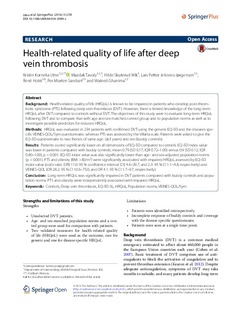Health‑related quality of life after deep vein thrombosis
Utne, Kristin Kornelia; Tavoly, Mazdak; Wik, Hilde Skuterud; Jelsness‑Jørgensen, Lars Petter; Holst, René; Sandset, Per Morten; Ghanima, Waleed
Journal article, Peer reviewed
Permanent lenke
http://hdl.handle.net/11250/2420634Utgivelsesdato
2016Metadata
Vis full innførselSamlinger
Sammendrag
Background: Health-related quality of life (HRQoL) is known to be impaired in patients who develop post-thrombotic
syndrome (PTS) following deep vein thrombosis (DVT). However, there is limited knowledge of the long-term
HRQoL after DVT compared to controls without DVT. The objectives of this study were to evaluate long-term HRQoL
following DVT and to compare that with age and sex matched control group and to population norms as well as to
investigate possible predictors for reduced HRQoL.
Methods: HRQoL was evaluated in 254 patients with confirmed DVT using the generic EQ-5D and the diseases specific
VEINES-QOL/Sym questionnaire, whereas PTS was assessed by the Villalta scale. Patients were asked to give the
EQ-5D questionnaire to two friends of same age- (±5 years) and sex (buddy controls).
Results: Patients scored significantly lower on all dimensions of EQ-5D compared to controls. EQ-5D index value
was lower in patients compared with buddy controls; mean 0.79 (SD 0.17; IQR 0.72–1.00) versus 0.9 (SD 0.12; IQR
0.80–1.00), p < 0.001. EQ-5D index value was also significantly lower than age- and sex-adjusted population norms
(p < 0.001). PTS and obesity (BMI >30/m2) were significantly associated with impaired HRQoL assessed by EQ-5D
index value (odds ratio [OR] 11.0: 95 % confidence interval [CI] 4.6–29.7; and 2.3: 95 % CI 1.1–4.8, respectively) and
VEINES-QOL (OR 28.2: 95 % CI 10.6–75.0; and OR 4.1: 95 % CI 1.7–9.7, respectively).
Conclusion: Long-term HRQoL was significantly impaired in DVT patients compared with buddy controls and population
norms. PTS and obesity were independently associated with impaired HRQoL.
